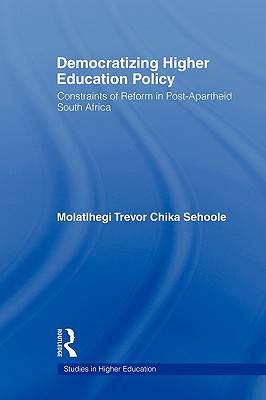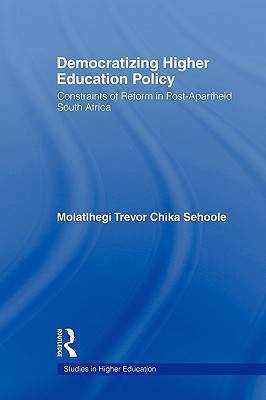
Je cadeautjes zeker op tijd in huis hebben voor de feestdagen? Kom langs in onze winkels en vind het perfecte geschenk!
- Afhalen na 1 uur in een winkel met voorraad
- Gratis thuislevering in België vanaf € 30
- Ruim aanbod met 7 miljoen producten
Je cadeautjes zeker op tijd in huis hebben voor de feestdagen? Kom langs in onze winkels en vind het perfecte geschenk!
- Afhalen na 1 uur in een winkel met voorraad
- Gratis thuislevering in België vanaf € 30
- Ruim aanbod met 7 miljoen producten
Zoeken
Democratizing Higher Education Policy
Constraints of Reform in Post-Apartheid South Africa
M T Sehoole
€ 96,45
+ 192 punten
Uitvoering
Omschrijving
This book was written with the purpose of analyzing the challenges faced by the post-apartheid government in South Africa with regard to reform of higher education. It covers the apartheid context of higher education, resistance to the system and its ultimate demise, democratic processes in post-apartheid reform agenda and how this agenda was emptied of its radical content as a result of global and local pressures. Highlighted are key constraints in the reform process, including the compromise pact agreed upon between the apartheid government and the ruling African National Congress, the rapidly globalizing environment underpinned by neoliberal principles within which South Africa's transition took place, shifts in macro-economic policies of government towards neo-liberal policy, the inheritance of the bureaucracy and the inexperience of new government officials. These are presented in a narrative style that combines the author's experience, the voices of key players involved and important data from a range of documentary sources. This is the first single authored book in post-apartheid South African that has systematically looked at higher education reform.
Specificaties
Betrokkenen
- Auteur(s):
- Uitgeverij:
Inhoud
- Aantal bladzijden:
- 250
- Taal:
- Engels
- Reeks:
Eigenschappen
- Productcode (EAN):
- 9780415884068
- Verschijningsdatum:
- 18/08/2010
- Uitvoering:
- Paperback
- Formaat:
- Trade paperback (VS)
- Afmetingen:
- 152 mm x 229 mm
- Gewicht:
- 340 g

Alleen bij Standaard Boekhandel
+ 192 punten op je klantenkaart van Standaard Boekhandel
Beoordelingen
We publiceren alleen reviews die voldoen aan de voorwaarden voor reviews. Bekijk onze voorwaarden voor reviews.









